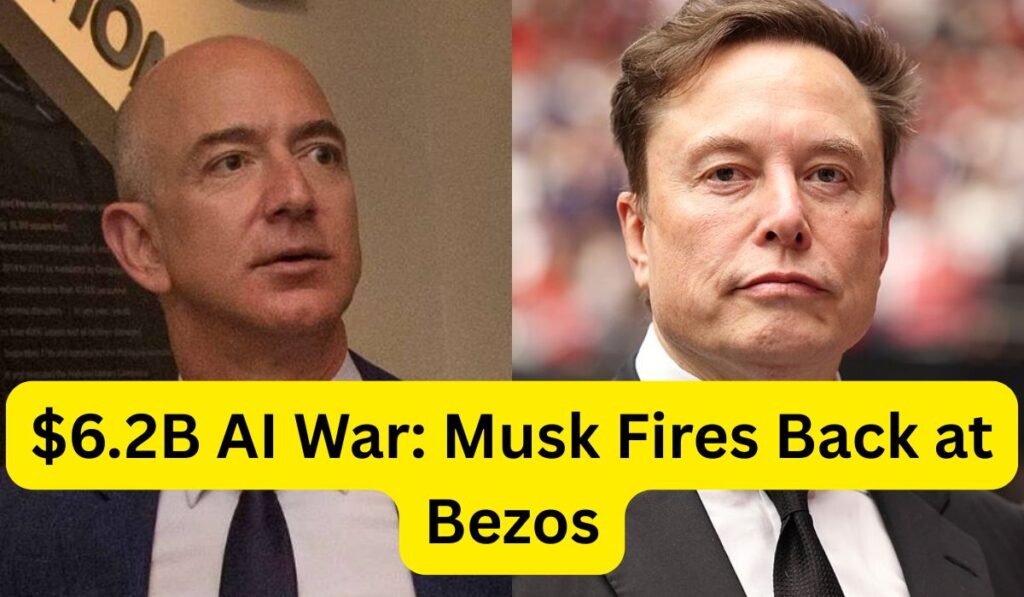Tesla CEO Elon Musk publicly challenged Jeff Bezos after the Amazon founder announced his entry into the artificial intelligence sector with a massively funded new venture. The exchange highlights intensifying competition among tech billionaires racing to dominate the AI landscape.
The $6.2 Billion AI Venture
Jeff Bezos revealed his latest business move as co-CEO of Project Prometheus, a new AI startup that has already secured $6.2 billion in funding. According to The New York Times, this substantial war chest positions Project Prometheus as one of the most well-funded early-stage startups globally. Bezos personally contributed a significant portion of the initial capital, signaling his serious commitment to this new direction.
The timing stands out here. Bezos, who stepped back from his day-to-day role at Amazon, is now channeling resources into artificial intelligence at a scale that immediately puts Project Prometheus among the major players in the space. That funding level for an early-stage company reflects both the perceived potential of AI technology and Bezos’s willingness to back this venture with substantial personal investment.
Leadership and Strategic Direction
Project Prometheus operates under dual leadership, with Bezos serving alongside scientist Vik Bajaj as co-CEO and co-founder. Bajaj brings significant credentials from his previous role as director at Google X, Google’s research and development division focused on breakthrough technologies. His LinkedIn profile now reflects the new position, though the startup’s own LinkedIn presence remains deliberately sparse—featuring a blacked-out logo and minimal details beyond a cryptic description referencing “AI for the physical economy.”
What’s particularly noteworthy about this setup is the pairing of Bezos’s business acumen and capital with Bajaj’s technical background from one of the most innovative research environments in tech. The “physical economy” focus suggests Project Prometheus aims to apply AI beyond software applications, potentially targeting robotics, manufacturing, logistics, or other tangible infrastructure—areas where Bezos has deep experience through Amazon’s operations.
Musk’s Public Response
Elon Musk, who founded his own AI company xAI in 2023, wasted no time responding to the news. Musk posted on X, saying “haha, no way” followed by “copy” and a cat emoji—a clear suggestion that Bezos is mimicking his move into artificial intelligence rather than charting original territory.
The reaction fits Musk’s established pattern of public commentary on competitor moves, particularly when it involves Bezos. The two tech billionaires have a history of competitive exchanges, from their respective space ventures (SpaceX versus Blue Origin) to other business initiatives. Musk’s cat emoji reference plays on the “copycat” accusation in his characteristic style of mixing serious business commentary with internet culture.
The Bigger AI Race
This development reflects the broader acceleration of AI investment and competition among tech giants and their founders. Musk launched xAI to develop AI systems, positioning it as an alternative to existing players like OpenAI (which Musk co-founded but later departed). Microsoft has invested heavily in OpenAI, while Google continues advancing its AI capabilities through DeepMind and other initiatives.
The speed at which Project Prometheus secured over $6 billion demonstrates investor confidence in both AI’s transformative potential and Bezos’s track record. For context, most early-stage startups struggle to raise even tens of millions. This funding level typically comes after years of development and proven traction—yet Project Prometheus achieved it essentially at launch.
Looking at the competitive landscape, the question becomes whether this represents genuine innovation or simply another well-funded entrant chasing the same opportunities. Bezos’s focus on “AI for the physical economy” could differentiate Project Prometheus if it successfully applies artificial intelligence to real-world systems in ways current AI companies haven’t fully addressed. Amazon’s experience with warehouse automation, delivery logistics, and physical retail gives Bezos unique insights into these applications.
What This Means for AI Development
The rivalry between Musk and Bezos in the AI space mirrors their competition in other sectors, but the stakes here extend beyond personal prestige. Artificial intelligence development will likely shape economic structures, employment patterns, and technological capabilities for decades. Multiple well-funded competitors pushing different approaches could accelerate innovation—or lead to redundant efforts and fragmented standards.
For investors and industry watchers, Project Prometheus’s early funding success signals continued appetite for AI investments despite questions about near-term profitability. The involvement of leadership from Google X adds credibility to the technical vision, while Bezos’s participation attracts attention and resources that might otherwise flow to established players.
The key question going forward: Can Project Prometheus deliver innovations that justify both its massive funding and its claim to a distinct position in the AI landscape? The deliberately mysterious public profile suggests the company wants to develop its technology before revealing specifics—a reasonable strategy given the competitive intensity and the risk of copycats in an industry where Musk himself is now accusing others of imitation.

